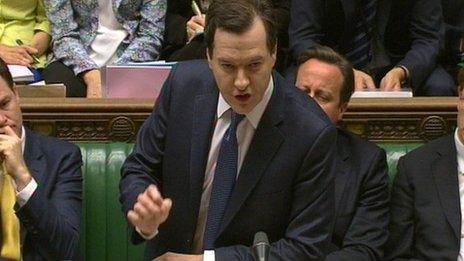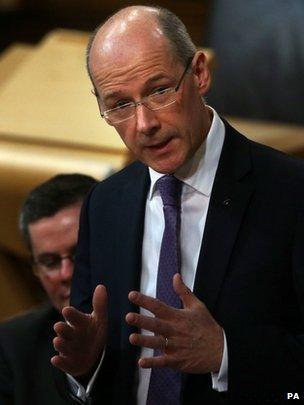Autumn Statement: Scotland to get an extra £308m in funding
- Published

Chancellor George Osborne said the SNP was "not being straight with people" about future oil revenues following a change in the forecast
The Scottish government's budget will increase by £308m over the next two years, Chancellor George Osborne has announced.
Mr Osborne said the extra cash, part of his Autumn Statement, external, meant spending by the Holyrood administration would be cut by less than 0.2%.
Most UK departments will need to make savings of 1.1%, a spokesman added.
But Scottish Finance Secretary John Swinney said the increase failed to make up for earlier cuts.
He argued Mr Osborne's plans showed the "damaging economic consequences" of remaining within the UK.
The announcement that millions would have to wait longer for their state pension would specifically hurt people on lower incomes, said Mr Swinney, and took no account of Scotland's lower life expectancy.
People now in their 40s will not get the state pension until they are 68, while those in their 30s will have to wait until they are 69, the chancellor told the House of Commons.
The Scottish government has said it would review the proposed pension age increases if Scotland votes for independence in next September's referendum.
The additional £308m in funding will be divided up between the Scottish government's resource and capital budgets.
Other measures in the the statement included:
Giving Scottish councils access to as much as £250m in cheaper borrowing.
Support for small and medium-sized businesses.
£10m for infrastructure projects in Shetland.
£10m in funding for the Higgs Centre for Theoretical Physics, in Edinburgh.
Giving councils in Glasgow and the Clyde Valley access to City Deal, a UK government initiative to boost building projects.
The Scotland Office said a move to abolish National Insurance for under-21-year-olds could save businesses in Scotland £45m and support the jobs of 138,000 young people in Scotland.
Mr Osborne said the Office for Budget Responsibility (OBR) had forecast that the UK's receipts for oil and gas will generate £3.5bn in 2016 - almost £4bn less than the previous estimate.

Scottish Finance Secretary John Swinney said Westminster's funding claims were ludicrous
This compares with the Scottish government's estimate of £6.8bn for Scotland alone in 2016-17, MPs heard.
Trade body Oil and Gas UK said it took a "less pessimistic view" than the OBR.
Mr Osborne said: "It is another example of how [the Scottish government] are not being straight with people about the facts around independence and it will of course mean that there is a black hole in an independent Scotland's public finances, which would cost the Scottish people £1,000."
Mr Swinney said the chancellor's figures were not consistent with industry expectations for production or current price trends.
He added: "Today's statement shows the damaging economic consequences for Scotland of a vote to remain part of the Westminster system. This is delayed action directed not at helping people with the cost of living but at embedding austerity.
"Scotland's budget is being cut by 9.9% in real terms over the current five year spending review period. In addition to these £3.1bn of cuts, Westminster politicians have now threatened to introduce £4bn of additional cuts if Scotland votes against independence.
"It is ludicrous for Westminster to claim increased funding for Scotland when today's announcement does not make up the ground lost by cuts announced earlier this year."
'In denial'
For the UK government, Scottish Secretary Alistair Carmichael said Scotland was benefiting from UK-wide measures to boost the economy.
He added: "The rest of the UK is already ahead of Scotland in providing childcare support, free school meals and, with this Autumn Statement, support for the high street too so that the shops we value and rely on get a little money back to help them succeed.
"They could crack on with the childcare package they announced last week, but are making it conditional on a 'Yes' vote to independence."
Margaret Curran, the shadow Scottish secretary, said the chancellor was "in denial" about the cost of living.
She added: "Families across the country are £1,600 a year worse off than when the Tories came to office, but they seem more concerned with cutting taxes for the highest earners.
"The Tories should have frozen gas and electricity bills and saved every Scottish household £120, while making long-term changes to the energy market. The government has let the energy companies off the hook again."